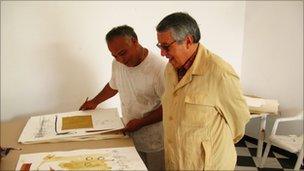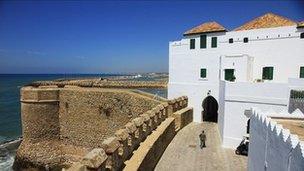Morocco's culture aids its economy
- Published
Mayor Mohamed Benaissa explains what inspired the festival
Cherries, camels, dates and even saffron; all are celebrated in colourful, traditional festivals in towns and villages throughout Morocco, yet none has brought enduring social and environmental benefits on the scale of the art museum in Assilah in northern Morocco.
The process began in 1978 when a few cleverly placed licks of paint began the transformation of a rat-infested, rubbish-strewn eyesore with open sewers into a clean and environmentally aware city.
Setting up a festival based on festooning the town's white walls with murals was a deliberate tactic by its photographer mayor, Mohamed Benaissa, to encourage civic pride in the town.
"We don't have any resources other than the cultural abilities and imagination of our residents," he explains. "But my faith in them has paid off."
Mayor Benaissa says he has different priorities from other festival directors, who may not even live in the city hosting the event.
"This city council has a duty to provide its citizens with shelter, employment and basic infrastructure," he says. "We dovetail these with running the festival."
Gulf country donations
The Assilah effect - sustained growth without "the Torremolinos effect" of high-rise hotels and overcrowded beaches - has encouraged other cities to regard art as a way of boosting income.

Mayor Benaissa has faith in the power of culture
From Fez, with its festival of sacred music, to Essaouira, with its Gnawa bands, and Agadir's Timitar based on amazing arts, culture lures foreign tourists who stay for the duration of the festival. Some even buy a second home.
But although lots of Moroccan cities have benefited from investment from Dubai in the construction of large-scale tourist projects, Assilah has side-stepped dependence on mass-market tourism, benefiting instead from Gulf country donations to build a library, hospital, clinic, school or cultural centre.
Key to Assilah's ability to benefit from socio-cultural financing offered by Gulf sovereign wealth funds is the festival's status as Morocco's first non-governmental organisation (NGO) and Mr Benaissa's close relationship with Gulf ministers, forged during his nine years as Morocco's foreign minister.
Key questions
Additionally, the Moroccan government's policies have brought it close to countries such as the United Arab Emirates, Qatar and Kuwait, which invest in commercial schemes in the kingdom.
Ministers and influential policy makers from these countries come in person to address international conferences at the Assilah festival.
The month-long "paint-in" has morphed into an event that confronts key questions that resonate with Africa, the Gulf, Latin America and Asia.
Issues such as immigration, investment in infrastructure, transport and alternative energy have all been debated and opinions have been shaped in this small Atlantic town.
The director-general of the Kuwaiti Development Fund, Abdulwahab Ahmed al-Bader, says Morocco, a member of the Arab League, has a very good relationship with the Gulf Economic Countries.
"It's been an ally in foreign affairs," he says. "It's part of our duty to support a country like Morocco."
High-level think-tank
The Kuwait-based Arab Fund for Economic and Social Development has paid for this year's festival, and previously built an old people's home.

Assilah's restoration has helped create a place for debate as well as culture
It is not alone. The Qatari Investment Corporation built new social housing projects after the construction of a fishing port and a highway from the airport in Tangier to Assilah by the Moroccan government.
Although the donor countries receive no financial benefit from their Assilah investment portfolio, they have the opportunity to participate in the wide-ranging conferences and debates that link together economic, environmental and political matters.
According to Fathallah Oualalou, Morocco's former finance minister and now mayor of the capital Rabat, putting together a sort of high-level think-tank underlines the importance of Assilah.
"Participants from African countries benefit from meeting the heads of Sovereign Funds in the Gulf, he explains. "We are part of Africa here and Assilah acts as a fulcrum between Europe and Africa, but also we have strong Latin American and Asian participation."
This year's conference on renewable energy, attended by UAE Foreign Minister Sheikh Abdullah Bin Zayed Al Nahyan, reminded the audience that more than half of the world's renewable power capacity was being developed in Africa, Asia and the Gulf.
This well attended forum was held in the Prince Bandar Bin Sultan Library, paid for by the former Saudi ambassador to the US.
With debates on Gulf sovereign wealth funds, the image of the Arab in sub-Saharan African media, and a prize for African poetry, it appears that Assilah can mix and match culture with economics and the environment in a way that leaves other Moroccan towns behind.
- Published2 July 2011